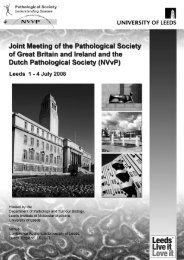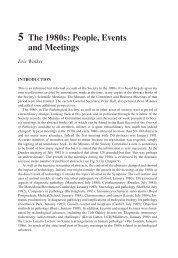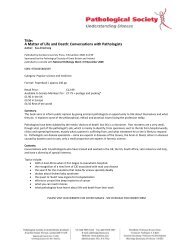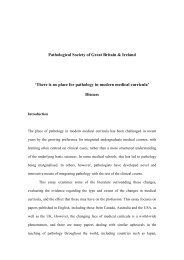The Future of Laboratory Medicine and Academic Pathology
The Future of Laboratory Medicine and Academic Pathology
The Future of Laboratory Medicine and Academic Pathology
Create successful ePaper yourself
Turn your PDF publications into a flip-book with our unique Google optimized e-Paper software.
220 UNDERSTANDING DISEASE<br />
clinical <strong>and</strong> academic laboratories in diagnostic test development. Until now, test development<br />
<strong>and</strong> refi nement has proceeded on an ad hoc basis, with clinical laboratories <strong>of</strong>fering limited <strong>and</strong><br />
non-contextualised testing for major reagent/kit manufacturers. <strong>The</strong>re is now an absolute need for<br />
a st<strong>and</strong>ardised approach in this area with defi nition <strong>of</strong> IPR, discovery <strong>and</strong> the concept <strong>of</strong> added<br />
value being defi ned in any interaction between the laboratory <strong>and</strong> third part suppliers. To put it<br />
bluntly, kit <strong>and</strong> chemistry verifi cation are central to successful technology platform development<br />
by industry, <strong>and</strong> laboratory medicine must see itself as a strategic partner in such a development.<br />
<strong>The</strong> era <strong>of</strong> ‘personalised medicine’ <strong>of</strong>fers enormous opportunities for laboratory medicine disciplines<br />
in the future, particularly in the area <strong>of</strong> devices, remote patient monitoring <strong>and</strong> customdesigned<br />
DNA, RNA <strong>and</strong> protein chips (see below).<br />
New emerging technologies, including robotics, humanoid technology, lab-on-chip devices,<br />
nanodevices <strong>and</strong> patient ‘smart’ implants, will in the future <strong>of</strong>fer unique opportunities for laboratories<br />
to develop new core business areas (discussed below).<br />
<strong>The</strong> ability to form research networks within hospitals <strong>and</strong> universities <strong>and</strong> externally with<br />
industry <strong>of</strong>fers a unique vehicle for laboratory medicine to achieve academic advancement. By<br />
placing laboratory medicine at the core <strong>of</strong> technology development in our hospital <strong>and</strong> medical<br />
schools, we will ensure a signifi cant element <strong>of</strong> future-pro<strong>of</strong>i ng for pathology. Strategically,<br />
pathology departments should even now be planning for future integration with the biotechnology<br />
sector through the development <strong>of</strong> ‘bio-incubator units’ in laboratories in order to develop translational<br />
cores in laboratory medicine.<br />
<strong>The</strong> 1990s have seen unprecedented economic growth in the West. However, economies <strong>and</strong><br />
economic growth usually follow cyclical trends: ‘the boom bust cycle’. No-one knows for how<br />
much longer the ‘boom cycle’ will continue but it is certain that a decline will eventually supervene.<br />
<strong>Laboratory</strong> medicine is perceived as expensive by healthcare strategists <strong>and</strong> planners, with<br />
high staffi ng, capital <strong>and</strong> infrastructural costs, <strong>and</strong> consequently a sustained increase in base costs.<br />
It is clear that these costs, while sustainable in the current economic climate, are not sustainable in<br />
the long term. <strong>The</strong> lack <strong>of</strong> a unifi ed <strong>and</strong> universally applied cost base analysis model for laboratory<br />
medicine disciplines again highlights the vulnerability in the current situation. Currently in Irel<strong>and</strong><br />
a conversation has commenced in relation to the provision <strong>of</strong> laboratory medicine services in the<br />
Republic in order to achieve high economic cost benefi t, controlled cost base <strong>and</strong> high quality<br />
service. Indeed, the provision <strong>of</strong> laboratory services in public hospitals is coming under increased<br />
scrutiny <strong>and</strong> how new models can be developed into the future is being assessed. <strong>The</strong> interaction<br />
between the public <strong>and</strong> private sectors has also received much attention <strong>and</strong> will become a dominant<br />
factor in relation to how laboratory medicine services are delivered in the future (see below).<br />
Threats to <strong>Laboratory</strong> <strong>Medicine</strong> <strong>and</strong> <strong>Academic</strong> <strong>Pathology</strong> as Assessed<br />
in 2006<br />
If we remain as we are <strong>and</strong> do not alter the way we are perceived, we risk marginalisation <strong>of</strong> laboratory<br />
medicine. We need to change disciplines or parts <strong>of</strong> disciplines in order to redefi ne who we<br />
are, what we are <strong>and</strong> what we do.<br />
We need to develop a strategic out-reach education programme <strong>and</strong> identify a national fi gure<br />
who will serve as an advocate for laboratory medicine, its mission <strong>and</strong> its role. We need to target<br />
specifi cally second-level education in education programmes organised by the Royal College <strong>of</strong><br />
Pathologists <strong>and</strong>/or pr<strong>of</strong>essional bodies.<br />
We need to redefi ne laboratory medicine <strong>and</strong> support the advancement <strong>of</strong> ‘clinical pathology/laboratory<br />
medicine’ akin to the US model, making the pathologist/laboratory scientist more<br />
accessible <strong>and</strong> visible to clinical colleagues <strong>and</strong> other healthcare workers. <strong>The</strong> laboratory needs to<br />
be redefi ned in terms <strong>of</strong> its role in the hospital, <strong>and</strong> the community as a centre <strong>of</strong> diagnostics that<br />
is important <strong>and</strong> pivotal to the needs <strong>of</strong> the patient.













